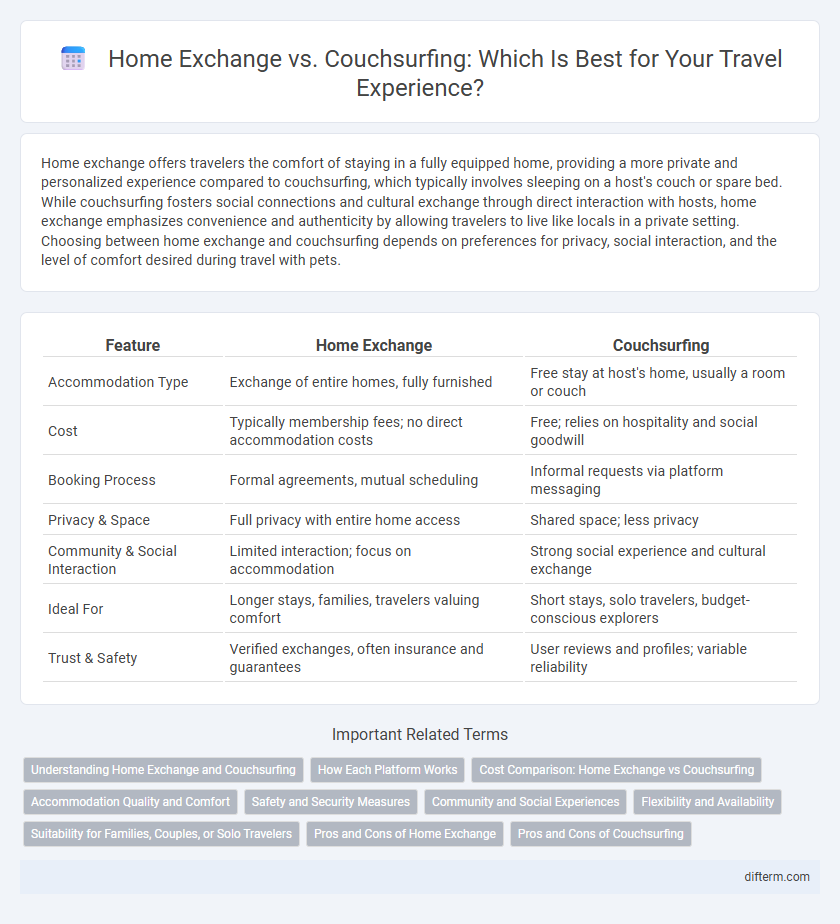Home exchange offers travelers the comfort of staying in a fully equipped home, providing a more private and personalized experience compared to couchsurfing, which typically involves sleeping on a host's couch or spare bed. While couchsurfing fosters social connections and cultural exchange through direct interaction with hosts, home exchange emphasizes convenience and authenticity by allowing travelers to live like locals in a private setting. Choosing between home exchange and couchsurfing depends on preferences for privacy, social interaction, and the level of comfort desired during travel with pets.
Table of Comparison
| Feature | Home Exchange | Couchsurfing |
|---|---|---|
| Accommodation Type | Exchange of entire homes, fully furnished | Free stay at host's home, usually a room or couch |
| Cost | Typically membership fees; no direct accommodation costs | Free; relies on hospitality and social goodwill |
| Booking Process | Formal agreements, mutual scheduling | Informal requests via platform messaging |
| Privacy & Space | Full privacy with entire home access | Shared space; less privacy |
| Community & Social Interaction | Limited interaction; focus on accommodation | Strong social experience and cultural exchange |
| Ideal For | Longer stays, families, travelers valuing comfort | Short stays, solo travelers, budget-conscious explorers |
| Trust & Safety | Verified exchanges, often insurance and guarantees | User reviews and profiles; variable reliability |
Understanding Home Exchange and Couchsurfing
Home exchange involves swapping houses with another traveler for a set period, allowing guests to live comfortably in a fully equipped home while fostering trust and mutual respect between participants. Couchsurfing offers a more casual experience where travelers stay on locals' couches or spare rooms for free, emphasizing cultural exchange and social connections. Both options provide unique opportunities for immersive travel, with home exchange prioritizing comfort and privacy, and couchsurfing focusing on community and affordability.
How Each Platform Works
Home exchange allows travelers to swap their homes for a specified period, providing a more private and convenient stay with access to amenities like kitchens and laundry. Couchsurfing connects travelers with local hosts who offer free accommodation, fostering cultural exchange and social interaction in a more casual setting. Each platform requires creating a profile, with home exchange often involving formal agreements and references, while Couchsurfing emphasizes community reviews and spontaneous hospitality.
Cost Comparison: Home Exchange vs Couchsurfing
Home exchange offers travelers a nearly zero-cost accommodation option by swapping residences, eliminating lodging expenses entirely. Couchsurfing provides free stays hosted by locals, reducing costs but potentially requiring more flexibility and shorter notice. Both methods significantly cut travel expenses compared to traditional hotels, with home exchange often suited for longer stays and Couchsurfing ideal for spontaneous, short-term visits.
Accommodation Quality and Comfort
Home exchange typically offers higher accommodation quality and comfort by providing entire homes with full amenities, creating a private and cozy environment for travelers. Couchsurfing, while budget-friendly and culturally immersive, often involves staying on a host's couch or spare room with fewer guaranteed comforts or privacy. Travelers seeking a balance between authenticity and comfort may prefer home exchange for reliable accommodation standards.
Safety and Security Measures
Home exchange platforms typically require thorough identity verification, secure booking systems, and mutual reviews to ensure safety and trust between participants. Couchsurfing offers real-time host ratings, profile verifications, and integrated messaging to enhance security but may involve higher risk due to informal arrangements. Both options emphasize community feedback and user accountability, with home exchanges generally providing more structured safeguards.
Community and Social Experiences
Home exchange fosters a deep sense of community by allowing travelers to immerse themselves in local lifestyles and neighborhoods, creating long-term connections based on trust and mutual hospitality. Couchsurfing offers spontaneous social experiences through a vibrant global network of hosts, emphasizing cultural exchange and immediate personal interaction. Both platforms enhance travel by prioritizing authentic relationships and shared experiences, yet home exchange provides more privacy while couchsurfing maximizes social engagement.
Flexibility and Availability
Home exchange offers greater flexibility for extended stays by allowing travelers to use a fully furnished home for days or weeks, whereas Couchsurfing typically suits shorter visits with hosts offering a couch or spare room. Availability in home exchange platforms depends on mutual agreements and planned scheduling, often requiring advance coordination, while Couchsurfing provides more spontaneous options with numerous hosts worldwide ready to accommodate last-minute travelers. Both options enhance travel accessibility, but home exchange prioritizes planned, flexible stays and Couchsurfing emphasizes immediate, short-term hospitality.
Suitability for Families, Couples, or Solo Travelers
Home exchange offers spacious accommodations ideal for families and couples seeking a comfortable, homelike environment, allowing travelers to live like locals with access to full amenities. Couchsurfing suits solo travelers and adventurous couples looking for budget-friendly, social experiences, often involving staying with hosts who provide local insights. Families may find couchsurfing less convenient due to limited space and privacy, while solo travelers benefit from its community-oriented nature and flexibility.
Pros and Cons of Home Exchange
Home exchange offers travelers the advantage of staying in fully equipped homes, providing comfort and privacy often missing in Couchsurfing. It allows for long-term stays and deep immersion in local lifestyles but requires careful planning, trust between parties, and may involve fees or membership costs. Though less spontaneous than Couchsurfing, home exchange ensures a reliable accommodation arrangement that can save significant lodging expenses during extended trips.
Pros and Cons of Couchsurfing
Couchsurfing offers free accommodation and authentic local experiences by staying with hosts who share cultural insights, making it budget-friendly and socially enriching. However, it may lack privacy and security, with variable host reliability and potential issues regarding comfort and safety. The platform requires trust and flexibility, which can be challenging for travelers seeking guaranteed amenities or structured lodging.
Home exchange vs Couchsurfing Infographic

 difterm.com
difterm.com